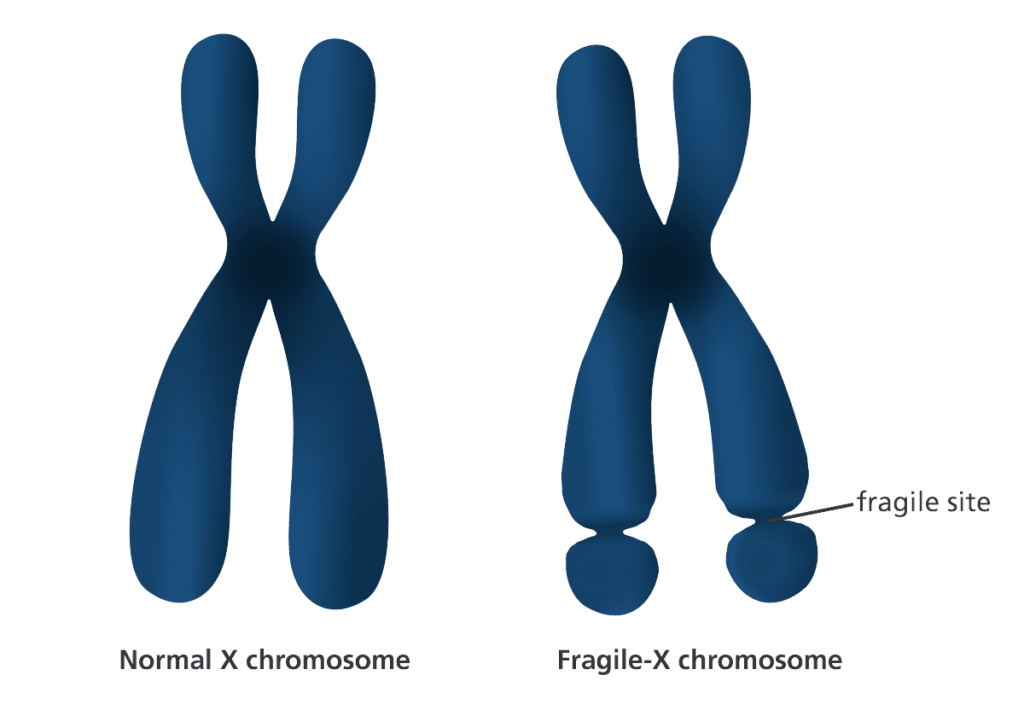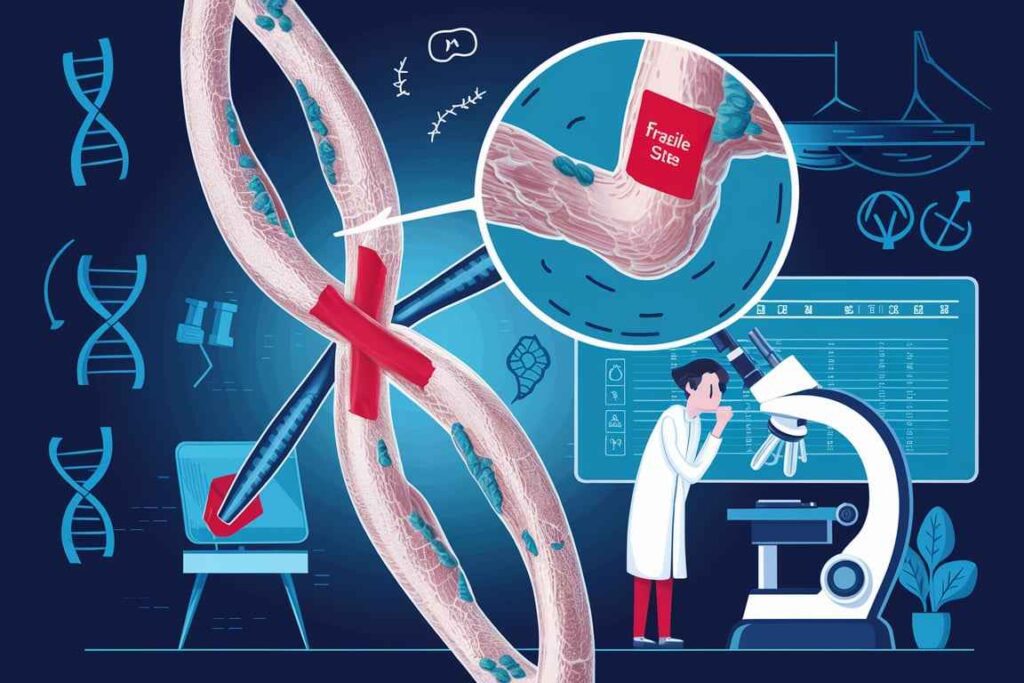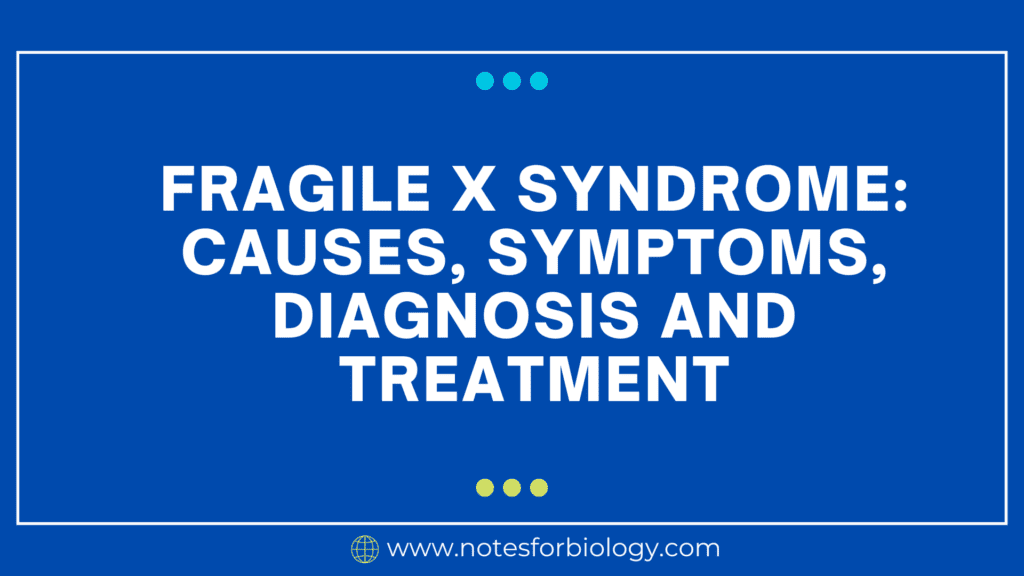Fragile X syndrome (FXS) is primarily caused by a mutation in the FMR1 gene located on the X chromosome. This mutation leads to a deficiency in the fragile X mental retardation protein (FMRP), which is essential for normal brain development. The inheritance pattern of FXS is X-linked dominant, meaning the mutated gene is carried on the X chromosome and can affect both males and females, but males are typically more severely affected due to having only one X chromosome.
Table of Contents
Fragile X syndrome
Fragile X syndrome (FXS) is a genetic disorder caused by a mutation in the FMR1 gene located on the X chromosome. This mutation leads to a deficiency or absence of the fragile X mental retardation protein (FMRP), which is crucial for normal neural development. As a result, individuals with FXS often experience a range of developmental issues, including intellectual disability, behavioral and emotional challenges, and distinct physical features. Symptoms can vary but commonly include learning disabilities, anxiety, hyperactivity, speech and language delays, and social difficulties.

Causes
Fragile X syndrome (FXS) is primarily caused by a mutation in the FMR1 gene located on the X chromosome. This mutation leads to a deficiency in the fragile X mental retardation protein (FMRP), which is essential for normal brain development. The inheritance pattern of FXS is X-linked dominant, meaning the mutated gene is carried on the X chromosome and can affect both males and females, but males are typically more severely affected due to having only one X chromosome.
Symptoms
Although the symptoms of fragile X syndrome can vary greatly, they usually consist of:
- Spectrum of intellectual disability: mild to moderate.
- Social challenges, anxiety, and hyperactivity are examples of behavioral and emotional challenges.
- Physical characteristics include a long face, big ears, and level feet.
- Speech and Language Delays: Articulation problems and expressive language delays.
- Attention problems and hyperactivity: These resemble the signs of attention-deficit hyperactivity disorder (ADHD).
- Autism Spectrum Disorders: A large number of people with FXS also display characteristics that are typical of those with autism spectrum disorders.
Diagnosis
Diagnosis of Fragile X syndrome involves:

- Genetic Testing: In particular, FMR1 gene mutation detection via DNA testing. A cheek swab or blood test can be used for this.
- Clinical evaluation and family history: medical history and physical examination to determine developmental milestones and physical characteristics linked to FXS.
Treatment

Management of Fragile X syndrome focuses on:
- Educational interventions: To assist learning and development, individualized education plans (IEPs) and special education services are provided.
- Applied behavior analysis (ABA) is one type of behavioral therapy used to treat behavioral issues.
- Medication: Occasionally administered to control symptoms like hostility, hyperactivity, and anxiety.
- Supportive Services: To address particular developmental requirements, speech therapy, occupational therapy, and social skills training are provided.
Prognosis
Even though fragile X syndrome is a lifelong condition that needs to be managed, people with FXS can have happy, fulfilled lives if they receive the right care and support from their families, friends, teachers, and medical professionals. For those with FXS, early diagnosis and intervention are essential to optimizing potential and improving outcomes.
Frequently Asked Question
What is Fragile X syndrome ?
Fragile X syndrome (FXS) is a genetic disorder caused by a mutation in the FMR1 gene located on the X chromosome. This mutation leads to a deficiency or absence of the fragile X mental retardation protein (FMRP), which is crucial for normal neural development
What happens to a person with Fragile X syndrome?
In individuals with Fragile X syndrome (FXS), there is typically intellectual disability ranging from mild to moderate, along with behavioral challenges like anxiety and hyperactivity. Physical features such as a long face and large ears may also be present.
Is Fragile X like autism?
Fragile X syndrome (FXS) and autism spectrum disorder (ASD) share similarities in social and communication challenges, but they have distinct genetic causes and characteristics. FXS is caused by a mutation in the FMR1 gene and is often associated with intellectual disability and specific physical features.
Related Article
Malonate test: Principle, Requirements, Procedure, and Result interpretations




